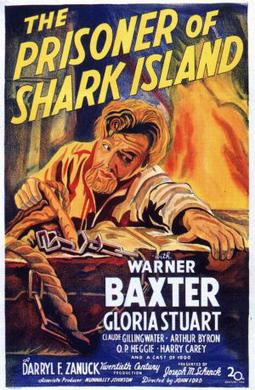The John Ford film, The Prisoner of Shark Island (1936), is about Dr. Samuel Mudd, who treated the broken leg of John Wilkes Booth shortly after Booth murdered Lincoln and was consequently arrested for conspiracy to assassinate (!) and sent to serve a life sentence in the Dry Tortugas.
When a decent man is victimized by the authorities—this is the message conveyed. As the terrible incidents roll, also conveyed are all kinds of values (and virtues): courage, persistence, belief in God, marital love and, despite the country’s injustice to Dr. Mudd, patriotism. Plus there is military pride, as demonstrated by Mudd’s crotchety father-in-law, an elderly Southern colonel (Claude Gillingwater). Today both he and Mudd would be seen as politically incorrect (yawn): the doctor, you see, is a decent, estimable SLAVER.
Prisoner is still riveting, and I agree with film critic Otis Ferguson about the strength and worth of the prison escape sequence. Nunnally Johnson’s script provides more depth than we generally get from Ford’s Westerns, even if the old American movies never enabled us to feel the ineradicable wound of life. Their unpleasantness was limited.


